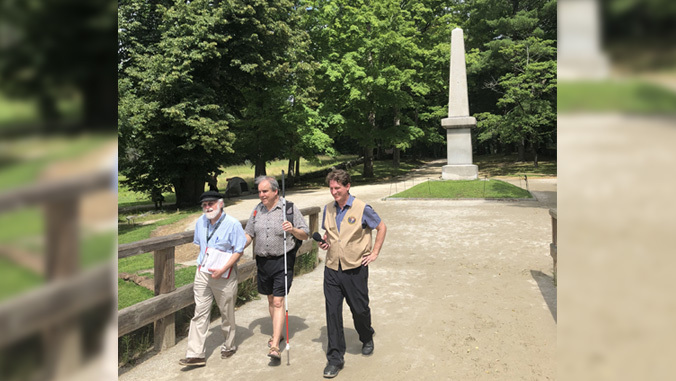
A University of Hawaiʻi at Mānoa initiative aimed at helping people who are blind or visually impaired has earned a prestigious honor.
The UniDescription project was awarded the 2020 Gold Media & Technology MUSE Award for Research & Innovation by the American Alliance of Museums.
With an open-access and open-source approach, the project offers online training and the digital tools necessary to broadly create and share audio descriptions for people who are blind or have low-vision. It is supported by external research grants from the U.S. National Park Service, Google and the National Endowment for the Arts, and provides services and programs at no cost to users in an effort to promote widespread media accessibility. Brett Oppegaard, an associate professor of communications in the College of Social Sciences, serves as principal investigator.
In selecting the UniDescription project, the international panel of judges stated, “The proof-of-concept project shows the possibilities for museums to make their stories accessible. By including free and open source tools for audio description, it has the potential to be a game changer for accessibility of heritage content.”
More than 100 U.S. National Park Service sites have collaborated with Oppegaard on this project, including Yellowstone National Park, Golden Gate National Recreation Area, Hawaiʻi Volcanoes National Park, Statue of Liberty National Monument and the Washington Monument.
The annual MUSE awards recognize outstanding achievement in galleries, libraries, archives and museum (GLAM) media, and are presented to institutions that enhance the GLAM experience and engage audiences through innovative digital programs and services. Research & Innovation, one of nine MUSE award categories, honors leading edge applied research and development, methodologies, innovation programs, investment programs, startup collaborations or industry initiatives that may be visitor or enterprise facing.
Audio description pioneer
Oppegaard has been studying the field of audio description in relation to mobile technologies and locative media since he arrived at UH Mānoa in 2014. During the past six years, he has worked with fellow UH researchers and graduate students, staff members and volunteers at the American Council of the Blind, and community partners throughout the country at U.S. National Park Service sites, refining and developing systems of audio description to help make public attractions more accessible to people who are blind or visually impaired.
Besides producing scholarship in academic journals, books and for academic conferences, Oppegaard has managed the creation of various open-source web tools and resources to support and grow audio description as a medium worldwide.
Related UH News stories:
- Professor’s pioneering audio description work wins award, August 13, 2019
- $100K Google grant expands accessibility at national parks, September 18, 2018
- Audio description app studied by field-research team at Muir Woods National Monument, May 7, 2018
- Mobile app for visually impaired field tested at Yosemite National Park, November 30, 2017
- Helping California national parks become more accessible for visually impaired, August 10, 2017

